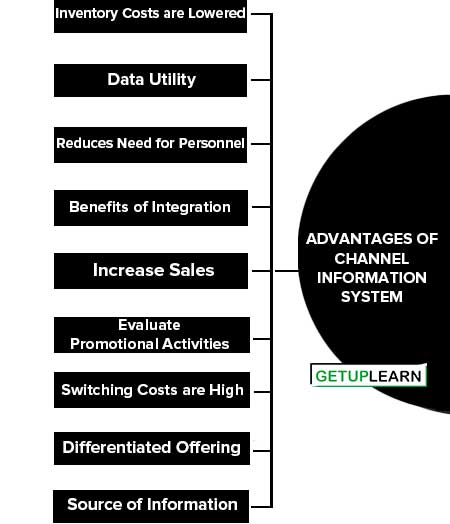Table of Contents
What is Channel Information System?
Channel Information System is the orderly flow of pertinent operational data both internally and between channel members, for use as a basis of decision-making in specified responsibility areas of channel management. Information technology has made a big difference to channel operations and management.
Information systems have revolutionized the way information is collected, stored, and transmitted between channel members. They add value to the distribution function and enable channel members to integrate different channel functions, which was not possible in conventional distribution systems.
Channel information systems have also influenced the structure of distribution channels. Lengthy channels have given way to shorter and highly efficient distribution systems.
Functions of Channel Information System
CIS is of primary use for sales managers. Information technologies are a precondition for the development of information systems, and thus information systems in a supply chain, i.e. in distribution or marketing channels. Information technologies can play various roles within a supply chain Information technologies are a precondition for the development of information systems, and thus information systems in a supply chain, i.e. in distribution or marketing channels. Information technologies can play various roles within a supply chain. Therefore, it is necessary to underline its specific role in it:
- The increases in market sensitivity,
- Simplification of distribution systems,
- The increase in the number of channel types,
- The increase in the market size,
- Wider use of e-commerce,
- Internationalization and easier access to global markets,
- Change in distribution channels.
Information technologies are used in three broad areas, according to their areas of application and technological systems in their hierarchical structures, the most complex technological business systems, such as ERP systems (Enterprise Resource Planning), were designed to cover and connect the whole company on the software level.
Targeted technological solutions (the lower level of technological solutions that facilitate optimizing certain business functions or enhance visibility along channels), such as warehouse management system WMS, transport management system TMS, or advanced planning system APS.
Technological tools for executive solutions: Electronic Data Interchange – EDI, the Internet, or RFID (Radio Frequency Identification).
Advantages of Channel Information System
Information systems can help a company acquire a competitive advantage over competitors and other channel members in terms of comparative efficiency or bargaining power.
The first enables the company to manufacture products and services cheaper than competitors, while the second gives the firm the ability to negotiate with other channel members to its advantage. The advantages of channel information system are explained below:
- Inventory Costs are Lowered
- Data Utility
- Reduces Need for Personnel
- Benefits of Integration
- Increase Sales
- Evaluate Promotional Activities
- Switching Costs are High
- Differentiated Offering
- Source of Information

Competitive Advantage in Terms of Comparative Efficiency:
- Inventory Costs are Lowered
- Data Utility
- Reduces Need for Personnel
- Benefits of Integration
- Increase Sales
- Evaluate Promotional Activities
Inventory Costs are Lowered
Information systems enable a company to transmit relevant data about product requirements and delivery schedules to suppliers. Thanks to ‘just-in-time’ delivery, the company saves costs, which would have been incurred for storage and transport.
It also enables shipping orders economically with minimum time spent on the trans-shipment of goods. The ordering pattern of suppliers can also be identified to facilitate proper delivery schedules.
Data Utility
Information systems enable information to travel at high speeds between channel members. The data can be transmitted in a standardized format, which means the firm can modify and analyze data quickly and easily, leading to better responses in shorter time periods.
Reduces Need for Personnel
Information systems assist customers and suppliers to access and check information electronically. This reduces the requirement for personnel to interact with customers and to enter and edit data.
Benefits of Integration
Implementing information systems helps firms enjoy the benefits of vertical integration like better control over channel activities, cost reduction, and improved coordination of different channel functions.
Increase Sales
Information systems increase the sales of a firm’s products by allowing cross-selling of high-margin products. Ordering procedures are also simplified, leading to higher orders and improved sales.
Evaluate Promotional Activities
It enables the company to precisely evaluate customer response to discounts, rebates, and other promotional activities. The company can also develop individualized sales messages based on information pertaining to customer purchase patterns, recorded in the information systems.
Competitive Advantage in Terms of Bargaining Power:
Switching Costs are High
By linking channel members with a unique information system, the firm reduces the chances of these members switching to a different system.
The need to retrain employees to ensure compatibility with a new system, the prohibitive cost of purchasing hardware and software, and the costs of organizing an information system, prevents channel members from moving to a different one.
Differentiated Offering
Implementation of information systems can provide a unique advantage over other distribution channels in terms of better product image, increased customer service, more information on product availability, and better product handling and ordering.
Source of Information
It allows customers to access information, on product specifications, alternative suppliers, price discounts, methods of ordering and delivery, and so on.
FAQs About the Channel Information System
What are the advantages of channel information system?
These are the advantages of channel information system:
1. Inventory Costs are Lowered
2. Data Utility
3. Reduces the Need for Personnel
4. Benefits of Integration
5. Increase Sales
6. Evaluate Promotional Activities
7. Switching Costs are High
8. Differentiated Offering
9. Source of Information.
